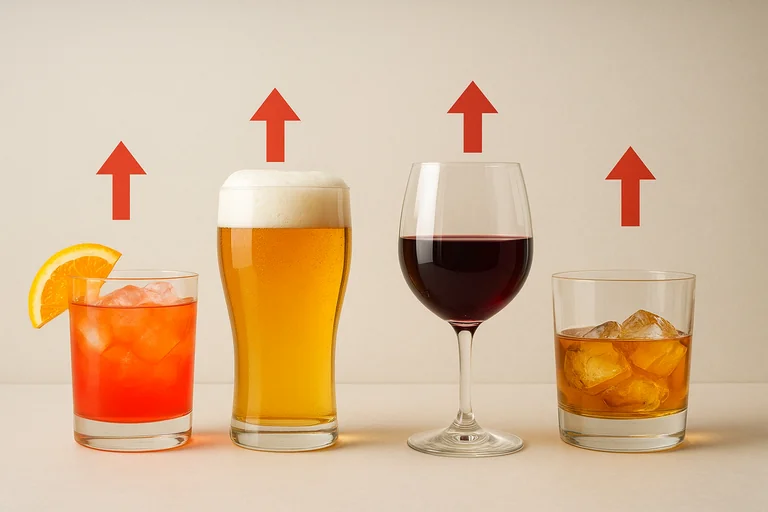A 2 minute assessment to get a personalized mental health or alcohol recovery plan.
You take a few sips, and then you feel it—a dull ache, a sharp twinge, or a tight pressure in your chest. Your mind immediately jumps to the worst-case scenario. Is it a heart attack? Is the alcohol doing serious damage? The fear is real, and you're right to be concerned.
What You'll Discover:
- What to do when you experience chest pain after drinking alcohol
- Steps to take to determine if it's a medical emergency
- The importance of understanding the connection between alcohol and heart problems
The idea of chest pain after drinking may be alarming to some people, but it's actually been a documented medical concern for decades. When traditional "ignore it and it'll go away" approaches fail repeatedly, causing widespread panic and confusion, many people assume they're having a heart attack. With modern understanding of alcohol's effects on the cardiovascular system, diagnostic tools and other medical knowledge now available, it's actually very straightforward to understand what's happening to your body when this occurs.
So, how does alcohol cause chest pain exactly? It's actually much more complex than you think with multiple body systems potentially involved.
Do Your Research About Alcohol's Effects on Your Heart
Before you begin taking steps to address chest pain after drinking, it's important to learn about how alcohol affects your cardiovascular system. In particular you want to look up information on:
- How alcohol impacts your heart and blood pressure
- What chronic alcohol consumption does to your body
- When chest pain requires immediate medical attention
Medical conditions are triggered by different factors, and alcohol-related chest pain is the perfect example. It's not just for people with severe heart disease who have multiple risk factors. It's also appropriate for people who want to understand why even moderate drinking can sometimes cause chest discomfort.
No matter what your drinking pattern, it's always best to know as much as you can about alcohol's effects before experiencing concerning symptoms.
Choose to Get Medical Evaluation
The next part takes medical assessment as well. You'll need to determine whether your chest pain requires immediate emergency care or can be addressed with your regular physician. This is an extremely important decision that goes well beyond just waiting to see if symptoms improve.
You'll want to make sure that you understand the warning signs of serious conditions to ensure you get appropriate medical care when needed. Experience with chest pain is also extremely important. Healthcare providers who have been treating alcohol-related medical issues for years and specialize in cardiovascular problems are going to be well-equipped to help with proper diagnosis and treatment.
Take an Assessment of Your Symptoms
The medical provider you choose should evaluate your specific symptoms to determine the underlying cause. This is a crucial part of the process for understanding whether your chest pain is heart-related, digestive, or caused by another condition.
This assessment is a simple yet crucial part of the process for determining what type of treatment will be most appropriate for your situation. It also provides healthcare providers with baseline information that will be important in subsequent steps of the diagnostic process.
Choose the Right Course of Treatment
If a specific medical condition is identified after your assessment you can discuss treatment options and develop a plan with your healthcare provider. With evidence-based medical approaches there are several proven treatments that all include different strategies for addressing alcohol-related health problems as well as ongoing monitoring.
Have Your Medical Consultation
The most essential step in addressing chest pain after drinking is having a thorough evaluation with a healthcare provider who understands alcohol's effects on the body. They will:
- Go over your drinking history and current consumption patterns
- Discuss your symptoms and when they occur
- Listen to your concerns about your health
This will help the provider determine what diagnostic tests may be needed and whether your symptoms require immediate intervention. If so, the healthcare provider will go over your treatment options and provide information on lifestyle changes that may be necessary.
Begin Following Medical Recommendations
After your medical consultation, you'll start implementing the treatment plan your healthcare provider recommends. This might include medication changes, lifestyle modifications, or follow-up testing depending on your specific situation.
The recommendations will focus on addressing the underlying cause of your chest pain and reducing your risk of future episodes. It's extremely important to follow medical advice exactly as prescribed, especially when it comes to alcohol consumption and heart health.
Take the Lifestyle Changes Seriously
Once you understand what's causing your chest pain you can begin making the necessary changes to protect your health. There will be specific recommendations about alcohol consumption, diet, exercise, and other factors that affect your cardiovascular system.
It's extremely important to implement these changes exactly as your healthcare provider recommends, particularly when it comes to reducing or eliminating alcohol consumption.
Follow-Up to Monitor Your Progress
Having ongoing follow-up appointments with your healthcare provider is highly beneficial in ensuring your symptoms improve and complications don't develop. It gives you the opportunity to discuss any ongoing concerns and for your treatment plan to be adjusted, if needed.
The provider can also help you monitor important health markers like blood pressure, heart rhythm, and overall cardiovascular function over time.
Why Your Heart Works Against You When You Drink
Don't let outdated ideas about alcohol being "heart healthy" fool you into thinking that chest pain after drinking is normal or harmless. The criteria for what makes alcohol dangerous to your cardiovascular system is clear based on decades of medical research.
Many cardiologists, emergency physicians and addiction specialists will tell you that alcohol has direct and immediate effects on your heart and blood pressure. Even moderate drinking can trigger chest pain in some people, and it's particularly harmful because chronic alcohol consumption creates lasting changes to your cardiovascular system that increase your risk of serious complications.
Now that you have a better idea of what's happening to your heart when you drink, let's delve further into the specific ways alcohol can cause chest pain and when you should be most concerned.
The Undeniable Truth About Alcohol and Your Heart
The undeniable truth is that alcohol affects your cardiovascular system in multiple ways, and any of these effects can cause chest pain. According to Medical News Today, alcohol can increase blood pressure, cause irregular heart rhythms, and disrupt blood flow to the heart.
High Blood Pressure and Heart Strain
Even a single episode of heavy drinking can cause your blood pressure to spike dramatically. The American Heart Association defines heavy drinking as four or more drinks in a single session for women and five or more for men, but some people experience blood pressure changes with much smaller amounts.
High blood pressure forces your heart to work much harder to pump blood throughout your body. Over time, this damages your arteries and reduces blood flow to your heart muscle, which can cause chest pain known as angina.
Irregular Heart Rhythms
Alcohol is a well-known trigger for irregular heartbeats, also called arrhythmias. You might feel this as a fluttering sensation, skipped beats, or a racing heart. The most common type linked to alcohol is atrial fibrillation (AFib).
AFib occurs when the upper chambers of your heart beat chaotically and out of sync with the lower chambers. This can cause chest pain, shortness of breath, dizziness, and significantly increases your risk of stroke.
Even people without diagnosed heart conditions can experience AFib from binge drinking, a phenomenon sometimes called "holiday heart syndrome."
Reduced Oxygen to Heart Muscle
When alcohol affects your blood pressure and heart rhythm, it can reduce the amount of oxygen-rich blood reaching your heart muscle. This causes a type of chest pain called angina, which often feels like pressure, squeezing, or tightness in your chest.
NEED TO KNOW: Angina isn't a heart attack, but it's a serious warning sign that you're at increased risk for one. If you experience chest pain that feels like pressure or squeezing, especially after drinking, seek medical evaluation immediately.
Alcoholic Cardiomyopathy: The Silent Heart Damage
What's most concerning about long-term heavy drinking is its effect on your heart muscle itself. Alcoholic cardiomyopathy is a condition where chronic alcohol use weakens and damages your heart muscle, causing it to stretch and enlarge.
According to the Cleveland Clinic, alcoholic cardiomyopathy can affect anyone who consumes too much alcohol over time, even those without a diagnosed alcohol use disorder. However, it's most common in people who have been drinking heavily for five to fifteen years.
The condition develops gradually, and chest pain is often one of the first symptoms people notice, especially during physical activity. Other warning signs include:
- Shortness of breath, particularly when lying down
- Swelling in the legs, ankles, and feet
- Extreme fatigue and weakness
- Dizziness or fainting episodes
- Heart palpitations or irregular heartbeat
- Persistent cough, especially at night
The prognosis for people who continue drinking heavily is extremely poor, with mortality rates as high as 80% within 10 years of diagnosis. However, stopping alcohol consumption can often lead to significant improvement and, in some cases, complete recovery of heart function.
When It's Not Your Heart: Other Serious Causes
While heart-related issues are a major concern, they're not the only reason you might experience chest pain after drinking. Alcohol affects multiple body systems, and problems in other areas can also cause significant chest discomfort.
Acid Reflux and GERD
Have you ever experienced a burning sensation in your chest after drinking? That's likely severe heartburn caused by acid reflux. Alcohol relaxes the muscle that separates your esophagus from your stomach, allowing stomach acid to flow back up and cause intense burning pain.
The chest pain from severe acid reflux can be so intense that it's often mistaken for a heart attack. If your chest pain is accompanied by a sour taste in your mouth, difficulty swallowing, or a chronic cough, you may have gastroesophageal reflux disease (GERD).
Anxiety and Panic Attacks
Many people drink to relieve anxiety, but alcohol can actually trigger severe anxiety as it wears off. As alcohol leaves your system, your nervous system can go into overdrive, potentially triggering panic attacks.
The symptoms of panic attacks can be terrifyingly similar to heart attacks, including:
- Intense chest pain or pressure
- Racing heart and palpitations
- Shortness of breath and feeling like you can't breathe
- Dizziness and lightheadedness
- Sweating and trembling
If you're prone to anxiety, you may be more likely to experience alcohol-induced panic attacks, creating a cycle where you drink to calm anxiety but end up with even more intense anxiety later.
Pancreatitis
Chronic heavy drinking is one of the leading causes of pancreatitis, a serious inflammation of the pancreas. This condition can cause severe abdominal pain that radiates to your chest and back.
The pain from pancreatitis is often described as a constant, boring pain that gets worse after eating or drinking. Other symptoms include nausea, vomiting, fever, and rapid pulse.
Pancreatitis requires immediate medical attention. If you have severe abdominal or chest pain after drinking, especially with nausea and vomiting, go to the emergency room immediately.
When to Call 911: Don't Take Chances
Because heart attack symptoms can be similar to other conditions, it's crucial to know when to seek immediate emergency care. Never try to "wait it out" or dismiss chest pain as just heartburn or anxiety.
Call 911 immediately if you experience any of these symptoms, especially if they last more than a few minutes:
- Chest pain or pressure: This can feel like squeezing, fullness, or pain in the center or left side of your chest
- Pain spreading to other areas: This includes pain in one or both arms, back, neck, jaw, or stomach
- Shortness of breath: This can occur with or without chest pain
- Other warning signs: Cold sweats, nausea, lightheadedness, or feeling like you might faint
Remember, it's always better to be evaluated and told you're having acid reflux or a panic attack than to ignore the signs of a heart attack. Emergency medical professionals would much rather assess you for a false alarm than have you suffer permanent heart damage or death from waiting too long.
The Connection Between Alcohol Problems and Health Problems
If you're experiencing chest pain after drinking, it's a clear warning sign that alcohol is affecting your health in serious ways. Whether it's your cardiovascular system, digestive system, or mental health, alcohol is taking a significant toll on your body.
The most effective way to protect your health and prevent future episodes is to address your drinking patterns. For many people, this is much easier said than done. If you're struggling to cut back or quit on your own, it's not a personal failure—it may be a sign that you have alcohol use disorder (AUD), a medical condition that requires professional treatment.
Modern, evidence-based treatments can help you regain control over your drinking and protect your health. Medications like naltrexone can significantly reduce alcohol cravings and help break the cycle of addiction. When combined with counseling and medical support, these treatments can be extremely effective.
Don't wait for another frightening episode of chest pain to motivate you to make changes. You have the power to protect your health and build a life free from the dangerous effects of alcohol on your body.
Taking a confidential online assessment is a simple, no-pressure way to understand your drinking patterns and explore your options for treatment. It's a small step that can lead to significant improvements in your health and quality of life.
Ready to learn more about your options? Take our Alcohol Use Assessment to get started.




